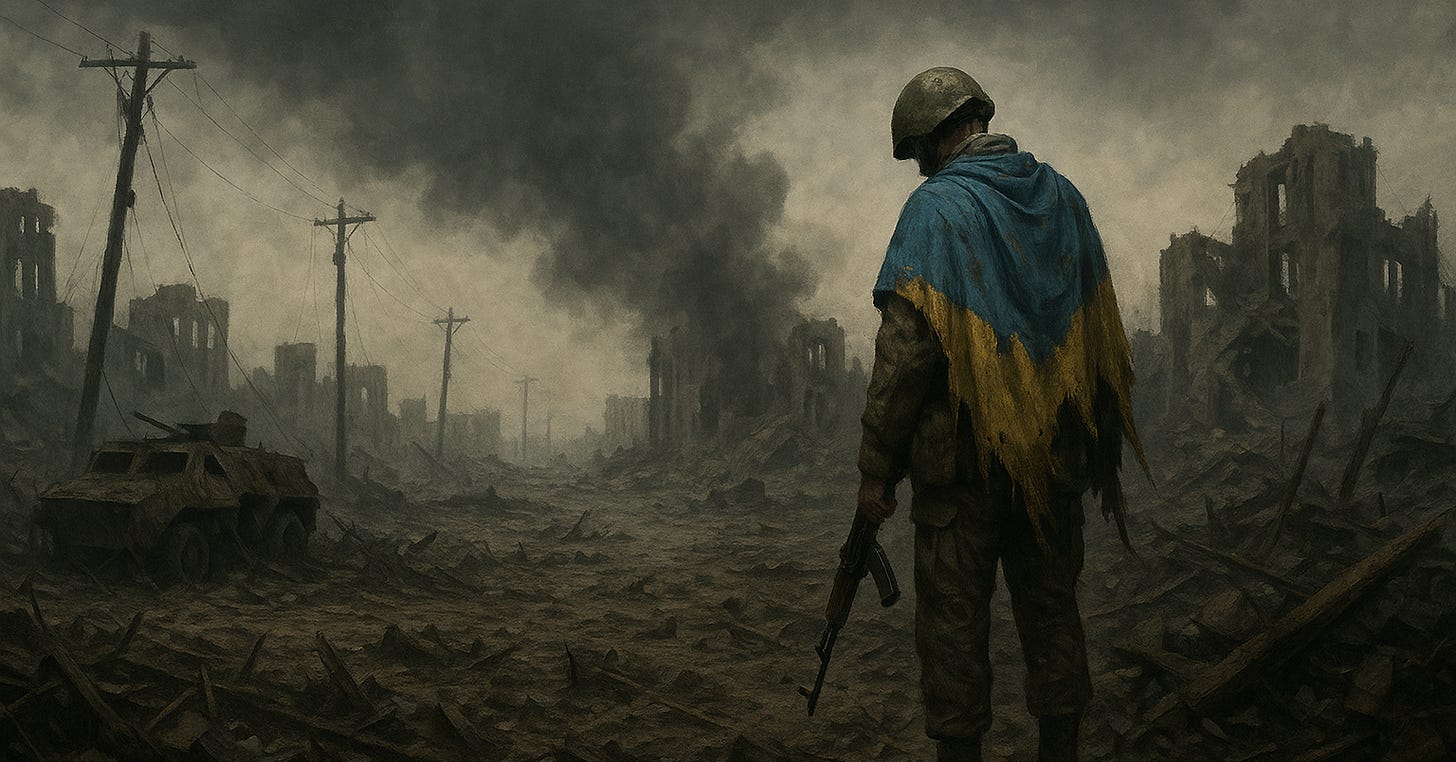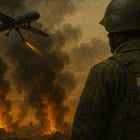Ukraine Can’t Win: The Cold Truth Behind a Lost War
Discover why Ukraine’s military defeat is already sealed—an unflinching realpolitik analysis of power, attrition, and the West’s crumbling strategic will.
Power, not principle, determines the fate of nations.
This axiom, stripped of sentiment, is the iron core of realpolitik—the only lens through which the war in Ukraine can be understood without illusion.
Ukraine’s war against Russia is not an epic of freedom against tyranny, nor a battle for the survival of representative democracy in Eastern Europe. It is a catastrophic misalignment between national strategic objectives and measurable geopolitical capacity. It is a confrontation in which the materially inferior state has wagered its national survival on the assumption that international political sympathy and sporadic foreign military assistance could somehow substitute for domestic industrial output and sustainable population reserves.
Now, Ukraine pays the price—daily and irrevocably—in combat deaths, in the surrender of physical territory, and in the visible deterioration of its governing institutions under the relentless pressure of unfulfilled war aims. The outcome was never in dout—not to those governed by realism, who understand that the ultimate determinant of survival in international conflict is not moral justification but the accumulation and application of coercive force.
The West, particularly the European Union, may continue to mask its strategic inadequacy in the elevated language of solidarity and collective resistance, may continue to deliver defensive weapons and issue declarations of unwavering support. But these performative actions cannot compensate for the underlying asymmetry in production capacity and military manpower.
Russia, by virtue of its geographic proximity to the battlefield and its industrial mobilization for sustained conflict, possesses irrefutable structural advantages.
Its defense manufacturing capacity, now operating on a wartime schedule, eclipses Europe's underfunded and disjointed armament production.
Its population base, approximately 140 million people, compared to Ukraine’s dwindling pool of around 30 million, provides a manpower advantage magnified by Russia’s control over newly annexed populations.
Its centralized governance can absorb both casualties and economic disruption with a resilience democratic systems simply cannnot replicate.
Ukraine has not been defeated due to a lack of determination or national cohesion—it has been defeated because it anchored its strategy in the illusion that values could override the brutal arithmetic of sustained warfare.
The foundational delusion underlying Ukraine’s national strategy—and Europe’s policy of proxy support—is the presumption that the collective will and fiscal resources of the European continent could be marshaled quickly and cohesively enough to rival Russia’s wartime posture. Yet this belief is inherently impossible within the structural limits of the European political apparatus.
The European Union is not a unified actor in the realm of military power. It is a coalition of 27 sovereign states, each with distinct military doctrines, procurement policies, historical traumas, and domestic political constraints.
Its bureaucratic decision-making, encumbered by unanimity rules and divergent priorities, inhibits rapid or scalable action.
Decades of underinvestment in national defense, in favor of social welfare expansion and post-Cold War pacifism, have left European militaries under-equipped and their industrial bases incapable of ramping up supply chains to match the tempo of modern combat.
Countries such as Germany, where defense spending remains politically contentious, or Italy, where strategic coherence is frequently interrupted by domestic instability, are emblematic of a continent that has not internalized the realities of industrial warfare.
This fragmented structure cannot deliver the volume or velocity of materiel required to alter the balance of the conflict. To expect otherwise is to mistake rhetorical unity for operational capacity.
Russia’s 2022 invasion of Ukraine was the implementation of a long-evolving doctrine of strategic depth and regional hegemony.
The occupation of Donetsk, Luhansk, Zaporizhzhia, and Kherson is not opportunistic—it is essential to Russia’s perception of its national security perimeter. These territories provide a physical buffer against NATO-aligned forces and serve as logistical corridors anchoring Russia’s hold on the Black Sea.
Crimea, annexed in 2014 and now transformed into a heavily militarized naval stronghold, is viewed by the Kremlin as an indivisible component of the Russian Federation.
The notion that Ukraine—its armed forces stretched, its infrastructure shattered by missile strikes, and its armament supplies rationed by the politics of foreign aid—can recapture these territories through direct military confrontation is not merely improbable; it is strategically incoherent.
Russia’s fortification of its positions and administrative integration of the local population all point to an enduring occupation. These developments are operational. And in the lexicon of realpolitik, permanence is not claimed through speeches; it is enforced through control of territory.
Time is not an abstract concept in this context—it is the decisive variable in attritional warfare. Russia has effectively restructured its national economy to support prolonged conflict.
Civilian industries have been redirected toward defense contracts;
Foreign trade has been realigned with China, India, and non-Western partners;
Capital controls and import substitution have blunted the effects of Western sanctions.
Sanctions, once viewed as the economic equivalent of siege warfare, have become a background condition—painful but insufficient to compel behavioral change.
Ukraine, by contrast, remains entirely dependent on foreign funding for budgetary stability and military procurement. Each shipment of artillery shells or Patriot missile batteries is subject to the political winds in Washington and the ever-shifting calculus of European capitals. Every delay in aid delivery is a logistical crisis. In realist terms, this is not support—it is structural dependency that cripples autonomous strategic planning.
Democratic states in Europe and North America operate within finite political cycles and volatile public opinion. As inflation rises, energy insecurity deepens, and the economic consequences of prolonged conflict ripple through middle-class households, political leaders retreat from commitments that once seemed permanent.
The growing influence of anti-interventionist populist movements—ranging from France’s National Rally to Germany’s Alternative für Deutschland—further constrains the policy space for robust, long-term support.
Establishment politicians adopt euphemisms like “strategic patience” or “conflict fatigue” to mask what is ultimately a withdrawal of resolve. The result is an erosion not only of material assistance but of political coherence. What began as an unprecedented show of transatlantic unity is dissolving into a fragmented, hesitant, and inconsistent postture.
The United States, often regarded as the indispensable security guarantor, is now an unreliable and distracted participant. With strategic focus increasingly shifting to the Indo-Pacific region to counterbalance China's rise, and with domestic political crises—from contested elections to debt ceiling standoffs—absorbing the attention of the executive and legislative branches, Washington’s bandwidth for Ukraine is diminishing. Continued aid packages, once passed with bipartisan consensus, are now mired in ideological disputes and electoral calculations.
The geopolitical relevance of Ukraine to core U.S. national security interests has never been robust. Russia poses no direct threat to U.S. territorial integrity or economic hegemony. As realist thinkers from George Kennan to John Mearsheimer have long observed, great powers do not
Keep reading with a 7-day free trial
Subscribe to Post-Liberal Dispatch to keep reading this post and get 7 days of free access to the full post archives.






